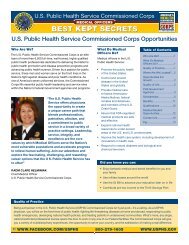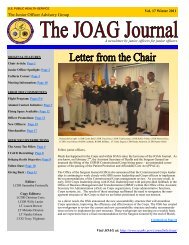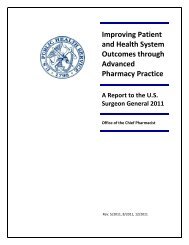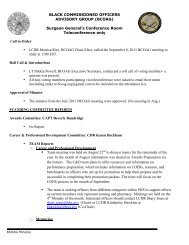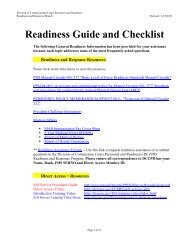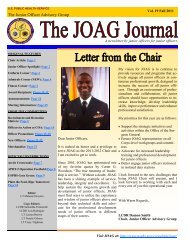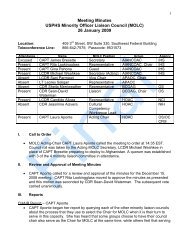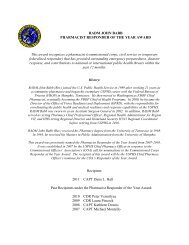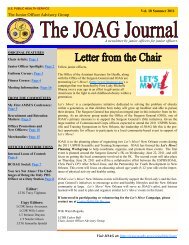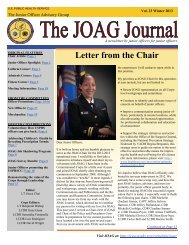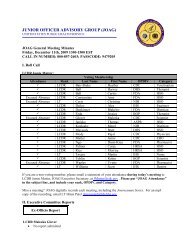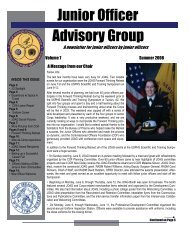FDA Session - U.S. Public Health Service Commissioned Corps
FDA Session - U.S. Public Health Service Commissioned Corps
FDA Session - U.S. Public Health Service Commissioned Corps
- No tags were found...
Create successful ePaper yourself
Turn your PDF publications into a flip-book with our unique Google optimized e-Paper software.
JUNIOR OFFICER ADVISORY GROUP (JOAG)COMMUNICATIONS AND PUBLICATIONS COMMITTEEUNITED STATES PUBLIC HEALTH SERVICE<strong>FDA</strong> Billets Transformation TranscriptQ&A <strong>Session</strong> with CAPT Byron BaileyThursday, 18 November 2009Transcriber: LCDR Samantha Fontenelle on behalf of the JOAG Communications and <strong>Public</strong>ationsCommitteeOperator: At this time officers should be in a listen only mode. This is the Question and Answersession of today’s conference. At that time you may press *1 if you would like to ask a question. Iwould like now to turn the call over to you. Thank you Ma’am, you may begin.CAPT Shaffer: Hi everybody this is CAPT Diann Shaffer with ORA. I know that all of you areprobably having a lot of questions about the billets that are coming up and coming out very soon.And it was great of CAPT Byron Bailey, from the DHHS Office of <strong>Public</strong> <strong>Health</strong> and Science, to give usa little presentation today. CAPT Bailey is our transformation officer for billets. And I am going toturn the presentation over to him now. Thanks CAPT Bailey.CAPT Bailey: You’re welcome. Thank you for this opportunity and, as I mentioned to Diane a littlebit earlier, I always welcome the chance to spread as many truths as possible so we can reduce therumor mill. I don’t really have a formal presentation put together, because I want to definitely allowthe majority of the time to answer people’s questions. I know there are a lot of questions and also Iwould be willing to bet (well I hope and that I am correct in my assumption) that a lot of folks haveat least a general sense of what billets transformation is about. I have provided a lot ofpresentations to virtually all of the PACs, through PAC conferences and teleconferences and to a lotof other groups of folks in different venues. Therefore, I don’t want to bore you by giving some ofthe same information unless there is a general consensus that there are a lot of people who reallyhaven’t heard anything yet. Which, like I said, I hope that isn’t the case. If so, however, I could givesome background information and talk a little bit more about what billets transformation is all1
about. So, Diane, do you have a sense from folks whether a basic knowledge of billetstransformation exists? This is your call, so I will go with however you think we should proceed.CAPT Shaffer: Okay, CAPT Bailey that would be great. If you can just give a little synopsis because Iknow I myself worked on billets for the Nurse PAC a few years ago but since then I really haven’tbeen getting updates as to where we are, because I know the multidisciplinary billets (which <strong>FDA</strong>uses) are not coming out until next May. So if you can just give us a little background synopsis,quickly, and then just go from where we are going to be at in all this.CAPT Bailey: Okay, well hopefully folks kind of have an idea of why we’re doing billetstransformation in that our billets system compared to the other uniformed services is inadequate.Take this with a grain of salt, however; we are not the other uniformed services. So I don’t want tosay that we’re anything like the Navy, the Coast Guard or anyone else like that. But our billet systemreally is kind of a mess right now. Because really, they [billets] don’t reflect our true positionsneeds to meet the missions of the Agencies who hire <strong>Commissioned</strong> <strong>Corps</strong> officers. So, a few yearsback there was a Classifications and Positions workgroup that was then set in motion by thenSecretary Leavitt. This group of folks, this workgroup, they looked at our current billets system.They looked at other billets systems in the other uniformed services, and they looked at whatneeded to be done, and they came up with a set of recommendations. Then Secretary Leavittendorsed those recommendations, and for the past three years that’s what we’ve been working(from on those recommendations) to build a new billets system for the <strong>Commissioned</strong> <strong>Corps</strong> of the<strong>Public</strong> <strong>Health</strong> <strong>Service</strong>. We’ve been working very closely with all the PACs through that three-yearperiod to develop standard billets for each of the category-specific standard billets. Right now,CAPT Eugene Freund (Medical officer), is here with us as another transformation officer in theoffice. He is working with some folks (including CAPT Greene) to create a set of standard billets formultidisciplinary positions, also. So we’ve been working on that, as I mentioned, for the past threeyears. This new billets system will definitely be a big improvement both for officers involved andalso for the agencies. We will now have an objective system to grade billets that is formula drivenand won’t be subjective; the way billets are currently graded is very subjective. We will have realtime vacancy monitoring. Hopefully folks have heard about the Direct Access system. We, the<strong>Commissioned</strong> <strong>Corps</strong>, we are merging our HR systems with the Coast Guard system. It is aPeopleSoft HR system and within PeopleSoft there is a component called Direct Access. Hopefullyfolks have heard about that through the officer profile system. Officers’ profiles have already been2
merged into Direct Access and our new billet system will be merged into Direct Access. With thisnew electronic system, we will be able to match officers and officer profile information with theelectronic billets. Billets will be specifically identified with specific attributes and we will be able tomatch those attributes to officer attributes. It will be a much improved way for our officers tosearch for jobs. It will also be a much improved way for agencies to find officers that meet theattributes for the positions that they are looking to fill.There are a lot of pluses on both sides of it. The biggest culture change with the new billets is thatthe new billets will very directly reflect positions and not officer capabilities. I have been in the<strong>Corps</strong> for 27+ years now, and I‘ve seen plenty of instances in my time (and I am sure a lot of folks onthis call have also) where an officer will be in a position and that officer is coming up for promotion.Let’s say that officer coming up for promotion is in an O-4 billet and coming up for their O-5promotion. In the current system, billets tend to be rewritten if an agency especially wants toretain that officer. They agencies will do what they can (which you can’t blame them) to rewrite abillet to get that officer potentially an advantage in the promotion process. Sure, that serves theofficer, but it definitely does not serve the <strong>Corps</strong>. It definitely does not serve us in trying to identify,for recruitment purposes or whatever, what kind of officers and at what grade levels we need in the<strong>Corps</strong>, because the billets tend to reflect officer capabilities and not truly the position requirements.That’s the big culture change in the new billets system.There will be a unique billet for every position in the <strong>Corps</strong>. The <strong>Commissioned</strong> <strong>Corps</strong> professionalcategories have come up with 390 of standard billet titles which will be used as templates to createthese unique billets. For example, in the Nurse category, there are 21 standard billet titles. If youare a nurse in the <strong>Commissioned</strong> <strong>Corps</strong>, and you are working in a category-specific nurse position,i.e., not multi-disciplinary, no matter what Agency you work for in the <strong>Corps</strong> you will have 1 ofthese 21 billet titles. Even though you have 1 of those 21 titles, it will still be a unique billet foryour position because along with the standard title with standard associated duties, there will beposition-specific components that the officer will add as part of the billet creation process. Theofficer will add those components to the billet and make that billet unique for his or her position.There are standard components that the PACs have developed or, in the case of themultidisciplinary billets, the agencies are helping to create right now, and there will also be theposition-specific components that the officers will help us to identify when we create billets in thenew system.3
We have gone through quite a lengthy process—as I’ve mentioned, three years for developing thestandard billets and also testing those billets in several different venues. A couple of years ago, wehad about 100 officers from the four largest agencies in the <strong>Corps</strong> who did a beta test of the systemto help us refine the format and how we are going to collect billets information. We did a smallerprototype test with 20 officers from the nurse category, about a year or so ago, to refine thatprocess a little bit more. What we have, now, is an almost completed system – an electronic systemfor creating billets, and that is what is described in the tutorial. If you have not looked at thosetutorials yet, please do. There are three tutorials – there is an officer tutorial, there is a supervisortutorial, and there is a reviewing official tutorial that are all on the CCMIS website. Please take thetime to review those tutorials, because they are very instructive of the whole process and how it isgoing to work. It would be helpful if you see that before we launch into this system.It is going to be an electronic system where each officer will be identified by category. Whether youare in a category-specific billet or a multidisciplinary billet, you will receive an email. It will be anautomated system. Let’s say you are a nurse in a nurse specific billet, for example. You will receive alist of the standard 21 billet titles for the nursing category. You will choose a billet title based uponthe description that accompanies each title that most closely approximates your currentresponsibilities. One of the things that will be harped on, over and over again, throughout thisprocess is that each officer needs to enter into the process with the background that or thoughtprocess that if I left this job tomorrow, what would be the minimum duties and responsibilitiesrequired of the officer that would backfill my position. Now we all know that sometimes when youare hired for a position, and you stay there for 2, 3,4, or 5 years, your duties sometimes change andcollateral duties are added on based upon capabilities that you have as an officer that are identifiedby your supervisor. Those aren’t necessarily responsibilities of that position, however, because ifyou left, the person who would backfill for you would not necessarily look for that person to dothose same responsibilities because they were tied to your personal capabilities. That’s thedifferentiation that is very important to make throughout this process.We have the tutorial for the supervisor and the reviewing official because the billets creationreview process is designed to try to eliminate bias as much as possible in the creation of thesebillets. The review process is very similar to the COER performance appraisal process. The officeris going to initiate the billet and then there is an electronic review system. Electronically, the4
supervisor would be prompted to review that billet and then, just like the COER, the reviewingofficial (in most cases, your supervisor’s supervisor) will also review the billet. Then there will besummary reports after it goes through these two review stages of the supervisor and the reviewingofficial. Summary reports of all the billets that are created will go to the PACs. So for example thenursing PAC will look at all the nursing billets that have been created. They won’t be reviewingeach one individually because it is just too large of a job. They will be reviewing the summaryreport and basically looking for outliers. In the example of junior clinical nurses, the Nurse PAC willbe looking at all the junior clinical nurse billets that are being created across all the agencies. Theywill be looking to ensure that there is equity in all those junior clinical nurse positions that arebeing created across the <strong>Corps</strong> - equity in grade, in job responsibility and those types of things.They will be looking for outliers. The agencies will be doing the same thing. The agencies will havethese same summary reports and they will be able to review the billets across the <strong>Corps</strong>. They willbe able to see the billets that were created for their agency and for all agencies. It will be a veryopen, transparent system where folks will be able to review those billets on many different levels.The final approval level will reside in OCCO. We’re in the process now of hiring, it hasn’t beenadvertised yet but it will very soon, a billets program manager. Basically a billets master, at theOCCO level, who will have the final review—summary level review of all the billets and the finalapproval will reside in OCCO. Billets will be able to be edited in the future after they are created butin the editing process, OCCO will be ensuring that billets are truly just being edited because theposition responsibilities have changed and not edited because there is an officer who is up forpromotion or whatever. Now, the biggest question that always comes up when you start talkingabout grades (you get a lot of anxiety built up among folks because the biggest thing that alwayscomes up is about grades) is what if in the new system I am in an O-5 billet and in the new system itturns out that my position grades out as an O-4. What happens to me? The answer is that there willbe a two year grandfather clause. For two years from when your new billet becomes official, youcannot be harmed if your billet grade decreased. For promotion boards, for assimilation or forwhatever purposes where a lower billet grade could potentially hurt you, you will not be harmedbecause the promotion board or whomever will still have your old legacy system billet grade andthat grade is the one that will be considered. During those two, the officer will have decisions tomake. Do I want to, after 2 years is up, have that lower billet grade have the potential negative effectthat could go with that or do I, in that 2 year period, start to want to look for a different positionwith a billet that is more commensurate with my grade as an officer. That 2 year grace period willallow the officer time to make those decisions.5
We have a tentative schedule for implementation, where if everything goes correctly, we arelooking at probably the end of January where we would start. We would go category by categorywith roughly a 1,000 to 1,500 officers at a time. Every 30 days we will launch another 1,000 to1,500 officers. The first group of folks is going to be the Nurse and Therapist categories in Januaryor the end of January, and we will move forward with categories from there. There is a frequentlyasked questions page on the CCMIS website, under Transformation, under Billets Transformation,This is a very exhaustive list of frequently asked questions and responses to those questions. I‘vereceived a lot of questions over the past 6 to 9 months from folks every time we released a newtutorial or did something different. There are probably 20 or so frequently asked questions on thewebsite that talks about what the schedule is for release and how grading is going to be handledand those kinds of things. I would strongly encourage you to visit that webpage and look at thosefrequently asked questions. As I’ve said, I don’t want to take too much time actually presentinghere, but I hope that kind of gives you a background on how things are going to work. I’d bepleased to take questions, now.Q&AOperator: Thank you Sir. We will now begin the question and answer session. If you would like toask a question please press *1. Please unmute your phone and record your name clearly whenprompted. Your name is required to introduce your question. To withdraw your question, pleasepress *2. One moment please for the first question to queue up.Q1. Hey, CAPT Bailey this is LT Hardin in with CAPT Shaffer. Yes. How are you doing today Sir?Good. How are you doing? Good. I was just wanted for ORA specific, Office of RegulatoryAffairs, I know there are probably a lot of ORA folks on the phone going oh my gosh I’m anurse, I ‘m gonna be graded starting January. I just want to let all ORA officer know thatpretty much 98 percent of all ORA officer are all in multi-disciplinary consumer safetyofficer billets even though you are a nurse or a pharmacist or whatever. So today will be thelast, according to the schedule to rate their billets and we pretty much have to standardtemplates with the information almost basic information ready to go for that. I just wantedto say that to hopefully maybe ease some of the tension that may be building for some of ourORA folks.6
A1. That is very true. Multidisciplinary will be the last ones. And we know, through the OCCOdatabase for all the officers in the <strong>Corps</strong>, if you are currently in a multi-disciplinary positionor in a category-specific position. If you are a nurse in a multidisciplinary position, you willnot get an email in January because we know you are not in a category specific nurseposition.Operator: Once again if you would like to ask a question, please press *1. Our first question comesfrom Matt, your line is open.Q2. Hi this is LCDR Matt McNew of Richmond. I had just a question about once these billets gothrough and are approved you mentioned earlier that there is a slight possibility that thebillet could be downgraded but is there a possibility that an immediate upgrade would beavailable?A2. Let me give a little background first before I answer your question. One thing that I did notmake clear is that when we go through this process of creating billets, we will be starting inthe end of January or so until we hit the last section of billets (multidisciplinary) in May orJune. The entire process won’t be completed probably until late summer. When all thebillets are created, by late summer, we‘ve done a review here at OCCO, and we’ve made anapproval—only then will any of those billets become official. I don’t see it until the latterpart of 2010 where the billets will become official where folks will be getting orders sayingthis is your new billet title. Nothing will become official until late in 2010 –even for thebillets that are created early in the calendar year. With that being said, when they dobecome official, if your billet grade increases in this process, increases will become officialin late 2010 and, if it decreases, there will be a two year period before the decrease becomesofficial.Q3. CAPT Bailey this is CAPT Shaffer. If OCCO is reviewing and OCCO does not have a clue as towhat we do in ORA, who is going to be reviewing to look at that side of it?A3. From the Agency perspective you mean? Yes sir. The agency will be reviewing summaryreports of all the billets that are being created for your agency. We will be working with the7
liaisons, and the Agency liaisons will be able to delegate or designate other individualswithin their agencies to assist in that review from the agency perspective.Q4. Hey, good morning this is CDR Bryan Cronin, here in Cando. My question was, obviouslyspecifically towards ORA. As we develop specialty, specialized training through <strong>FDA</strong>,obviously that’s a different realm than our nursing kind of spins off of CAPT Shaffer’scomment there that hat I have PHS colleagues that may have the exact same rank that I dobut have different experience levels by training. Are we suppose to incorporate ourpersonal specific training that we receive by <strong>FDA</strong> because we bring and I know it kind of tiesin saying you are more capable but the basics skills that everybody needs to have to come inthere ultimately management wants us to go to specialized training and be valuesspecialists not generalist. So are we given that latitude to be able to incorporate thattraining into our billets? And I’ll listen offline.A4. The only training that will be incorporated in the billet will be the minimum trainingrequired for that position—not officers’ capabilities that may be above and beyond what isrequired for the position. That is the biggest departure from the current system, and I knowthat is a big change for folks. It is a big thing to grasp but that is a very critical part drivingthe success of the new billet system—the position does not reflect officer capability but onlyminimum requirements of the position.Q5. Hi my name is Danielle DeDonna and I work out of San Pierdo for ORA. I guess this isspecific to the ORA agency but I am a little but confused and I don’t know if you can providesome clarification. For example, I am a physician assistant, so that qualifies me for my jobwith the <strong>FDA</strong> ORA specifically. And in this job there are other people doing the same thingthat I am that may not even necessarily have a Bachelor’s degree. So these are civilianpeople that I am speaking of. I do the same job as some civilian counter parts. So, the billetwill be created based on your educational background and have some input from youractual Agency. How will that go down because I am confused because my training andeducation and I worked formally for Immigration and I was a clinician. I had collateralduties and to diversify with PHS I came to a non-clinical billet and I am just kind ofwondering how that will play out because I do have a lot of different skills but I don’tnecessarily use my clinical skills for my current billet. So I guess my question is, will that8
somehow or another take away from my ability to promote when I was trying to help mypromotion potential by diversifying.A5. It should not take away from your ability to be promoted. If it is truly a multi-disciplinaryposition that you are in, i.e., you are a PA, buy you didn’t have to be a PA—you could havebeen a nurse (or other category) to fill the position. That position will still have to reflectlevel of responsibility and level of independent judgment, and all of those things factor intothe formulas which determine grade. And if those levels of responsibility and originalityand things that are required of this position will drive the grade. If it drives the grade to anO-5 or an O-6 (I’m sorry I do not recall what your current rank is) that grade is independentof your officer grade. The new billets system includes a very objective process for creatinggrades based on responsibility. Therefore, as long as the billet grades out to an O-5, andthat’s what would be most beneficial to you, then it should have no negative impact on yourpromotion capability.LT Hardin: Hey CAPT. Yes. This is LT Hardin and I’m gonna speak most specifically to the ORAfolks on the line. ORA actually in a very good position because we pretty much have a somewhat ofa detailed stratification of our officers already. We already have it set out to be O-6 in an O-6 billetyou need to be a national expert or a Sr. level supervisor. To be in an O-4 billet you need to be doingindependent inspections on your own and available for the foreign cadre. So we already have a verydetailed stratification. So our transition compared to other agencies should be a little easier as faras our multidisciplinary consumer safety officer billet. Such as a nurse at IHS vs. a nurse at NIH –one may be in an O-4 billet and one may be in an O-3 billet and they both may be doing board duty.I think people should understand that they are trying to make those types of billets across theboard, standard. As far as ORA is concerned our advanced trainees are pretty much all at the samelevel. You may have a PhD and you may only be a dental hygienist but your level as a consumerofficer is the same. Which may be confusing to some people but your skill at that position will putyou in an O-4 billet – essentially you are available to do independent inspections and you areavailable to be with the foreign cadre, etc. I hope that helps out some of our <strong>Corps</strong> officers.In the FAQs section on the billets transformation webpage I mentioned previously, one of thequestions in there is in regards to the old CC Personnel Manual Pamphlet 57. That old Pamphlet 57was created 20 something years ago. I t was never formally used for grade development in the9
<strong>Corps</strong>. But the workgroup that we assembled a couple years ago, to look at the whole billettransformation issue, that workgroup decided that Pamphlet 57 had a lot of value. We took thatPamphlet 57 and upgraded it and refined it to meet our current needs. The grading criteria thatwere in contained in Pamphlet 57 are the grading criteria that are formula based in this new systemto determine the grades for billets. The reason I bring this up is because it is raised in FAQs, and theresponse to that FAQ specifically list the types of factors and the point range that are associatedwith those factors. How those points will equate into grades answers that question. That may giveyou some insight and it will kind of give you an idea of the types of things that will drive grades.Ffor example, in a multidisciplinary billet those factors are independent of what your category is;they are more reflective of your work contact, your duty station criteria , your supervisorresponsibility, and what your accountability requirements are for your job. It discusses thosethings. So that might help to answer some questions by viewing that FAQ.Q6. LCDR Matt Diaon: Yes, hello, I have a question. I work for ORA, and currently we havecertain standard billets, such as O-5 would be a Sr. Regulatory Affairs Specialist, O-4 is anInvestigator, full level. If you are in one of those categories and you are performing thoseduties, are those going to be altered at all? Are the characteristics of the O-4 or O-5 billetsgoing to be changed?A6. There will be new billet titles. What is being proposed now, I know CAPT Freund is workingon multidisciplinary billets, and that there will be approximately12 billet titles for allmultidisciplinary billets across the <strong>Corps</strong>. That is what they are proposing right now, like Isaid, but it hasn’t been finalized yet. All multidisciplinary billets, including the billet youcurrently encumber, will be one of those 12 billet titles. The attributes of your current billetwill be reflected in this new billet title and it will just have a new billet name. Theattributes, in terms of what you do, your job responsibilities, and your level ofresponsibilities—those will all be reflected in the new billets. One of the things, of course,people start worrying about, once again, are grades. I want to mention grades one moretime, another aspect of this, a little bit for clarification. I mentioned that we did a beta test acouple of years ago and in that beta test (and I really do believe this will probably carryover) 85% of the folks who participated in that did not see their billet grade change. In only15% of the billets did the grades actually change. Grades only went up or down in about15% of the cases. To get back to your question though, what is currently in your billet10
should be reflected in the new billet but it will have a new billet title to fit 1 of the proposed12 billet titles that exists for multidisciplinary. Does that answer your question?Q7. Partially, but I am a pharmacist working for ORA and when you go to ORA and you areexpected to perform in drug investigations or “biomo” investigations would your priorexperience as a pharmacist - are you just going to be held against other pharmacist- becauseit is a multidisciplinary billet. So if you were going to give my billet to someone who is inenvironmental health officer, it may require additional training because they don’t have theprior knowledge of pharmacy work. And I know you said that prior experience and officercapability aren’t being considered for a particular position, but how does that factored in?A7. The question that needs to be answered is, is your billet truly multidisciplinary or is it abillet that a pharmacist needs to fill?That is one of the questions that will come up. And this is one of the things that will arise.There are over 1,500 multidisciplinary billets out there—I think that 1,800 is the mostcurrent count. From the 1,800 multidisciplinary billets out of the 6,500 total billets for<strong>Corps</strong> officer right now, we suspect that there are quite a few billets that aren’t trulymultidisciplinary. The bottom line is there may only be specific category of officer that anagency is willing to consider to fill a billet. That is going to come out through this process.When we get to multidisciplinary billets, and people start reviewing those billets, there maybe some changes made. There may be point where, and I am not saying this is your case,(but potentially a case like yours) where it comes back that in reality we really just want apharmacist for this position. It isn’t truly a multidisciplinary position. If that’s the case, inthe pharmacy category (which I cannot remember off the top of my head how manystandard billets were developed by the pharmacy category—I think around 30, if one oftheir standard billets doesn’t fit, we may have to go back to the pharmacy category and saylook, here is a pharmacist that works for <strong>FDA</strong> ORA and ORA has decided that it really isn’t amultidisciplinary billet, it is really a pharmacist billet. If one of the current 30 somethingstandard billets doesn’t fit, the pharmacy category may have to create another standardbillet to fit that specific situation. We aren’t going through this process thinking that wehave it all completely figured out, it’s all cast in stone, and what we have now will beforevermore and we know we’re going to learn from lessons as we go through this process11
of billet creation. So, just know that that flexibility is out there. We are going to be looking ateach case independently and making adjustments as needed.Q8. CAPT Bailey. Yes, ma’am. This is CAPT Shaffer. LT Hardin and I were talking because I was alittle concerned that if we had 12 titles for all the multidisciplinary billets and 12 peoplepicked 12 different ones, what would happen. He explained to me that before the billets willgo out to the field, the liaisons will go through them and pretty much say if you are in an O-6billet this is the one you will choose and if you are in an O-5 billet this is the one you willchoose. Correct? And if they are in a certain billet, this is the one that they would select tofill in?A8. Yes there is a crosswalk that’s true, not necessarily by grade but there is a crosswalk thatCAPT Freund and the folks that have been working on multidisciplinary billets have created.They looked at all the titles that are out there right now and created a crosswalk that willhelp folks sort out exactly that. If this is your current billet title, this is the new title thatmost likely is the one that applies to your position. So you cut out a little bit of the confusionthat could result from folks just having open season.Q9. LT Hardin: So CAPT that’s what we would all like – picking a position or title that is higherthan the one we already. As far were concerned, ORA is very stratified already and wepretty much have our levels already broken down. So we can pretty much in advance let ourofficers know, once we’re notified say you’re a national expert that fits into this level billet.You’re a full performance investigator so you fit into this O-4 level billet that’s labeledprogram analyst or whatever and fill in the rest from there. We could hopefully help ourofficers upfront so they are not picking billets that are not appropriate, right?A9. Well, the new billets aren’t stratified by grade. The 12 unique billets titles that are proposedby CAPT Freund, in working with CAPT Green on this, are not stratified by grade. They arejust titles, and depending upon the level of responsibilities that are selected within thosetitles, that is what will drive the grade. There definitely can still be some preemptive workthat goes into helping to identify, for example, for the different levels you’ve identified, whatthe selection should be on the standard billet to help drive the grade. For example, level ofresponsibility or personal responsibility requirements—those types of things. That could be12
predetermined and be helpful for guiding selections to result in the proper grade for thatbillet.Q10. So basically what you’re saying if I understand you right, there is 12 names and 6 paygrades within each pay grade mean there is a 2, 3, 4, 5, 6, 7 level pay grade along with thebillet title. And hopefully one of the billet title names will be consumer safety officer. Andthen we can say this is a 2- level, 3-level, 4-level within that name?A10. Not predetermined levels. Those levels will be determined based upon the selections thatare made within the standard billet. If you look at the tutorial, the description in the tutorialwhere it shows how people are going to make the selections is in there. It talks about howthe selections are going to drive grade. That very instructive in telling you how it is going towork. I’m trying to bring up here quickly, CAPT Freund, he sent me – hold on just a second Iam pulling up a document because I want to tell you what some of these preliminary billettitles are that he’s come up with. It might be instructive. Okay, these are the 12 billet titlesthey have come up with at this point – that are proposed – Program Coordinator, ProgramManagement Officer, Research Officer, Technical Specialist, Epidemiologist, Watch Officer,Statistician, Analyst, Consultant, Personnel Management Officer, Educator – I think that’s allof them. Anyway those are the types of titles that they’ve come up with. Like I said, theyhave done a crosswalk to look at all the current multidisciplinary titles that are out there forwhich one that they would fit in. The descriptions for these 12 titles are relatively genericand it’s going to allow a lot of latitude for the agency or the officers, with input fromsupervisors in the agencies, to get more position-specific responsibilities to go with that. Itmight have been a good idea, I should have pulled CAPT Freund in here, but he could tellyou what they are working on and what he’s been working on with CAPT Greene, how theyhave come to this point. It would probably be a good idea, and we will have to address thatand get him in here and get more feedback from him, especially since your issues areprimarily multidisciplinary. But there are not six predetermined levels. It not like, forexample, technical specialist O-2, O-3, O-4 – it is not predetermined. It will be technicalspecialist and depending on the level of responsibilities that are selected for thoseattributes, that will drive whether the billet is an O-2, O-3 or O-4. You won’t be going intothis thing saying, “oh here is a technical specialist multidisciplinary billet and here are the 613
levels”, and you’re not going to say that “I’m going to select the O-3 level”. You won’t select itupfront. You will select attributes that drive – formula driven calculations.Q11. So since we already have predetermined attributes at each level we can at least give thatinformation upfront at least they can load their billet with the predetermined information.A11. That is very true. You can definitely do that. Now you need to look at what those attributesare. Make sure that your predetermined attributes match the attributes that are available inthe new system. That would be the only thing that you need to make sure that they match.Q12. CAPT Bailey, this is CAPT Shaffer. In ORA, before an officer can be put up for an increasebillet, they have to go through supervisory and management approval. I have a feeling if wehave officers whose billets would be increased; we’re going to receive some resistance fromthat.A12. CAPT Bailey: Receive resistance from?CAPT Shaffer: From managers, if there are increased. In the review, if there are officerswho are increased or downgraded we may receive resistance from managers as to the factthey are being increased.CAPT Bailey: There is a process for adjudication for billet discrepancy and gradediscrepancies, which we know will occur. But when that type of thing occurs, there will bean opportunity to appeal. We will look at them on a case-by-case basis and deal with themaccordingly. There is an adjudication process that is set into the new billets policy.CAPT Shaffer: Okay thank you!Q13. Yeah, hi, hey. This is CAPT Clint Chamberlain, Division of Human Resource Development. Iwas kind of asking, thinking about a big picture question. I was curious to know when all thebillets get sorted out, and OCCO has this ability, do you think their role is going to change inany manner as far as the future. Maybe, for example, assignments and centrally managing14
assignments for officers given new capabilities? Do you know what the end result is going tobe from where OCCO sits?A13. The main difference between what OCCO does now, in the current legacy system, and whatOCCO will be in the new billet system is—well let me preface this first by saying that theAgencies will always own the billets because agencies pay for those positions. So there willnever be a point where OCCO will be calling the shots. What the effort is with the new billetsystem, though, is to at least have a central approval process at OCCO which ensures thatthere is equity in billets and billet titles across agencies and even looking betweencategories to ensure that there is equity in the entire process. The current process, is willynilly.Basically, the way it is now, an agency sends a billet in here and they pretty muchdecide what the billet is going to be and it is rubber stamped by OCCO. There needs to besome oversight to ensure that there is equity across the <strong>Corps</strong> in similar position titles.There is going to be more of a centralization, obviously, of the entire process within OCCOand the new system but by no means will OCCO ever own billets. We will never be in aposition where we are calling the shots.LT Hardin: CAPT, may I interject just a second or two, this is LT Hardin, to help expand on that alittle bit. Direct Access is probably a little more of what you’re looking for there, Sir. In the fact thatbillets will help Direct Access and Direct Access in the near future will be our closest thing to a forcemanagement tool. Because once we populate Direct Access with everybody with their current billet,when somebody vacates that, Direct Access will be able to say, hey, here is an open position. Thesepeople said that they are willing to move within this timeframe, to this location, to perform thesetypes of duties and it will generate a list of potential officers for that vacancy so that the agencydoes not necessarily have to go out and shop. We can actually generate for them a list upfront sothat …Actually we cannot dictate that you have to move because agencies own you and your billet.But when you are ready to move, Direct Access will be able to tell us when those vacancies occur.And also, there are many, many jobs out there that officers can hold …that we don’t know about.And as we begin to follow that in Direct Access we will see those fields populated so they may onlybe 6,500 officers but we will know in 10 years if there are 15,000 positions available for officers.And I hope this helps with maybe what you were asking before.15
CAPT Bailey: Actually, that is excellent information. That is the long term goal, but the immediategoal is to describe the current positions held by the 6,500 officers in the <strong>Corps</strong>. The long term goalis to describe any position in HHS or in other participating departments or agencies that potentiallycould be encumbered by a commissioned officer. So, we could expand. There are some positionsnow that are held by civilians that maybe in the past were held by commissioned officers, or thereis a potential in the future to be held by a commissioned officer—we will describe those positionsalso. We will greatly increase the pool of potential job opportunities for <strong>Corps</strong> officers to fill in thefuture. So, yes you are correct. The other part of that is that to make clear, and I know youmentioned this Josh, but I also want to make clear that when the officers are identified for positionsthat come open, they will only be officers who have self-identified themselves as potentiallyinterested in moving. Therefore, if you are an officer and you have not self-identified that you areinterested in potentially switching positions, an agency won’t be knocking on your door and sayinghey, come work at this job. You will maintain, as an officer, some control over that process.Q14A. This is LCDR Diem Ngo. Sir, I have two questions for you. Regarding the comment that youmade about the two year grandfather which you get if your billet gets downgraded and ifyour billets get upgraded it gets upgraded immediately. In terms of promotion boards, Iunderstand that they look at the PIR for different billet changes. So are you saying that ifyour billet is downgraded your PIR will not be changed for 2 years and if it is upgraded itwould be changed immediately in your PIR?Q14B. And my second question is, for those who have critical billet addendum underadministrative rules, how would this affect us?A14A. Great questions. The answer to your first question is yes! It is exactly as you’ve described it,so if you’re upgraded it’s a bonus and it happens immediately once things becomeformalized or otherwise in 2 years a downgrade would be reflected in your PIR. The wayyou described it is correct.A14B. The billet addendum – it is interesting that you bring that up because we are in the midst ofdealing with that right now. Billet addendums are really specific to the officer and are notspecific to the billet. So, if addendums continue to exist in the new system, they won’t bepart of a billet anymore. They will still be potentially identified as part of the officer’s profile16
or part of the OPF but they won’t be tied to the billets anymore, because our billets will bedescribing positions, not specific officers. The future of that is really up in the air right nowbecause there is a federal court case, in regard to Tort claims, and whatever the outcome ofthat case could greatly change realities for folks in nonclinical billets working in clinicalroles. The bottom line is that I can’t answer the question as to exactly how it’s going tohappen because we are awaiting the results from this federal court case in regards to Tortclaims. I don’t actually know what the future holds for billet addendums other than to saythat it won’t be “a billet addendum” anymore it would be an outside work related activityand will somehow be tied to the officer’s OPF.Q15. CAPT Bailey this is LT Hardin again. If am going in front of a promotion board and my billethas been downgraded or stayed the same, wouldn’t a promotion board then see that mybillet isn’t one of the new billet titles or an upgrade. They will know that I am still in thesame billet and that my billets been downgraded just because it has the same old name.A15. Theoretically! That’s a good point. Do you know what I am saying? Yes, I know exactly whatyou’re saying and we will have to figure out how to deal with that some way. Maybe in thesystem we will find a way to give you the new title but still show the old grade. That’s agood point and we haven’t figured out how to handle that yet. But yes, that’s a good point.Q16. CAPT Green: Thank you. CAPT Bailey, Thank you very much for answering some of thesecomplex questions. CAPT Shaffer, you will be a part of the process of evaluating theappropriateness of the billet levels for all billets in the ORA but you will work with yourmanagers to make sure that all is well and that the billets (unable to decipher what wassaid). Initially after going through this beginning process officers can initiate the billets andassign various attributes to their billets and management at that point will review thoseattributes and say yeah or nay and make modifications accordingly and you will be a part ofthat process and our decision from ORA will be cleared management and blessed and theagency level and forwarded to OCCO.So what CAPT Bailey is saying is that management will have input into the process andreally the final decision about whether an officer billet will be at an O-6, 5 or so on. So thatwon’t be a problem. The billets with regard to the multidisciplinary billets, in <strong>FDA</strong> we went17
from about 70/80 something billets down to like 12. So this crosswalk is really going toassign a title. So it’s going to say that if you are a consumer safety officer at this level thenyou are going to be “performa” 1 and there are going to be certain attributes that will beassigned to that and that will determine whether the “performa”1 is at the 6 level, the 5level, the 4 level and on. Once that is signed by the officer, management has to approve italong with CAPT Shaffer. Once you guys clear it then it’s gonna come to the agency and thenforwarded on to OCCO.CAPT Shaffer I will share with you some preliminary information that CAPT Freund and Ihave been working on so you will understand exactly how we are progressing here. Noofficer is going to be harmed in any way. One interesting point that CAPT Bailey made that isvery important is a billet requires you to be a nurse or a pharmacist – that may not be amultidisciplinary billet so that gonna trigger if you must be pharmacist working in a certainposition then we will have to look at the system and this is not a multidisciplinary billet, it isa category specific billet and therefore, that will be a change and we will have to look at thatand determine whether or not certain credentials are required for certain positions. For themost part, it is progressing very well and I am very comfortable because, I was not opposedbut I had a lot of concerns because I didn’t want to see officers get harmed. LT Hardin, youasked a good question about how will promotion board see the change and CAPT Baileyresponded that they are going to work out the details so that promotion boards will not beable to distinguish whether or not my billet is a new billet vs. grade change, etc and I getharmed during the promotion review process. So, I think we are headed in the right way. Itis going to be streamlined, the billet process; it is going to be more efficient. Again as wassaid earlier, its going to tie into Direct Access which down the road it will be mandated. Ifyou use the system, it will help drive more of a centralized command system with regard toofficers being able to take on new positions, etc., etc.Thank you very much CAPT Bailey, CAPT Shaffer, LT Hardin and everyone for pulling this alltogether so that people could understand how the new system is going to work.Q17. This is CDR Ponte?? from the San Francisco District Office and I have a question about thebillets. Some of the comments that have been made by CAPT Green and some of the otherpeople have sort of reference this and doing the tutorial may actually answer some of the18
questions also. But it is a question in my mind along with the pharmacist that spoke earlierand some of the comments from CAPT Green made about being Consumer Safety Officers,Investigators. I am a nurse and I do biologics and well you don’t have to be a nurse to dobiologics and certainly you don’t need a Masters Degree in nursing to do biologics. But notonly am I an investigator there are collateral duties there. So what I was wondering aboutand possibly there could be a few more comments made on this that might help out. Theother collateral duties that I do are registration monitoring and administrative things thatreally have a managerial role as well as the other duties that I perform as an investigator.So (1) I would like to hear some comments on the officer-specific information of where theofficer has experience and training that may not necessarily be required for that particularbillet but brings a lot of advantage to the Agency to have those attributes coming into thatbillet. So how do those get incorporated into this? Do those have an impact on the gradelevel that is shown for that officer? And for the other comment that I want to make, and Ithink I heard this earlier, is that for an O-4 grade for some of these multidisciplinary billetsin ORA should reflect that the officer is available to the international cadre. I have to behonest what I have heard before this is that really was not an expectation and yet there areO-4 that are available to the international cadre that do international inspections butmanagement here and other officers that I have spoken with think that this is more anactivity for an O-5 billet to represent the Agency in an international arena and doinspections oversees. So could someone make comments on that because I would like alittle bit of clarification on there and thank you for hearing my questions.A17. You’re welcome. In regards to collateral duties, that has been a central subject of discussionthroughout this entire process of creating these new billets. It was very clearly stated in therecommendations of the Secretary’s Positions and Classification Workgroup, the multiagency,multi-category workgroup that did a lot of work to create these recommendations,they were very clear in stating (and obviously you are right, the Agency is gaining a greatdeal of value from the collateral duties and additional attributes that officer possesses) thatthose things had no business being in a billet description unless it truly did becomesomething that was required of that position. Those attributes and collateral duties wouldbe reflected in the officer’s CV and reflected and acknowledged in the COER, the<strong>Commissioned</strong> Officers Effectiveness Report, but would not be part of the billet. I knowexactly what you’re talking about, because my first 16 years in the <strong>Corps</strong> was with the19
Indian <strong>Health</strong> <strong>Service</strong> and I spent about 9 years in the California Area office in Sacramento.In the course of 9 years you take on a lot more duties than were you hired to do. So, I knowexactly where you’re coming from on that, but in the new billet system those collateralduties will not be reflected in the billet.LT Hardin: This is LT Hardin again with CAPT Shaffer. Just to let you know, once again the billet iswhat helps you get the job. Your collateral duties are what make you a more valuable person. Allthat information does not get lost. That’s what you get to cover in your COER and your promotioninformation, etc. The Boards doest understand that the billet title is the absolute minimum to holdthe job. All the extra collaterals that you do gets covered in your COER and that gets signed off byyour supervisor and reviewing official. As far as ORA force cadre stuff that you mentioned I doubtCAPT Bailey has much info on that because he doesn’t work with ORA but GS-12 are an O-4equivalent but they are moving forward with the fact that O-4 billets are GS-12 equivalent, so therewill be exceptions that you will be available to perform trips. And I will let CAPT Shaffer say a littleabout that.CAPT Shaffer: We all know that in a GS-12, well O-4 billet is supposed to be doing independentwork which means you should have applied for the foreign cadre. I would expect that to be one ofthe criteria for an O-4 billet. You should be applying for the foreign cadre. If someone has issueswith that, I’ll be glad to discuss.Q18. Good afternoon, this is LCDR Boden. I have a question about if a person gets a billet withposition description has certain aspects that they are not performing would I include that inmy reviewer documentation through this process we are doing. Also, if when I leave orvacate that position and someone else comes in will they have to do a new process. Willthey have to go through that again if they pick up the duties that are under that positiondescription?A18. CAPT Bailey: I am not sure I understand the first part of that question. Is there somethingin your billet that you are not doing? Give me an example.LCDR Boden: Okay, I am an emergency coordination, Sir in ORA. One of my standardposition descriptions does describe that I am going to be a contracts officer or duties similar20
to that with the state contracts – a reviewing officer for that. I am not performing theseduties at this time and I don’t know if I will be in the future. That is up to my DistrictDirector. So would I include that even thought as part of my position description?CAPT Bailey: Well from the point where you start creating this billet, and your supervisorand all the folks start reviewing it, I guess they need to make the determination if it is trulypart of your position responsibilities or not or part of the position you encumbered. If it not,then there needs to be review of whether or not it should be in there from the folks aboveyou.CAPT Green: This is Russell Green, CAPT Bailey I agree with what you’re saying that wouldbe something that the officer, if it a part of his/her billet, they would go ahead and include itand if that management in ORA would make the determination whether or not that officershould have that characteristic remain as part of their billet. And also, if managementdecided not, then CAPT Shaffer would remove that characteristic from that billet. So theofficer should not remove that on their own because they may hurt their billet in terms ofwhat level because management today may not have you doing that but tomorrow all of asudden management may have you doing that. So management will make thatdetermination whether it should be included.CAPT Bailey: Exactly, and the second part of your question in regards to when a new officercomes into a billet—billets will have the capability to be edited at any point in time. It’s notlike they are frozen in stone but the difference between the way they are edited now, sort ofwilly-nilly, especially to reflect officer capability, that’s the part where there will be a verystrong stance taken. When a new officer comes into a new position, the vast majority of timethere should be no rewriting of billets because if the billets accurately documented theattributes the first time around, there really should be no changes made unless there truly isa change in position responsibilities that are independent of officer capability.Q19. CAPT Shaffer: Hey CAPT Bailey and CAPT Green, I am assuming if someone tries to rewritea billet that that’s gonna have to go through the chain, through a liaison. Is that correct?21
A19. CAPT Bailey: Yes. All the way to the top. All the way to OCCO. The billet program manageris going to reside in OCCO. That individual will be taking a very hard look at any edits thatcome through, and if they are legitimate that’s fine. But it is really going to be closely lookedat ensure that they are legitimate position changes.Q20. CAPT Shaffer: Whenever we do billet changes now we do a 1662 but it sounds like oncethis is put into effect that is probably going to be done away with. Is that correct?A20. CAPT Bailey: You are correct. It will be a new electronic way of doing it, but the details ofthat are still being worked on.Q21. LCDR Walberger: This is LCDR Matt Walberger in Kansas City. CAPT Bailey thank you fortaking my question. Some of this may have been answered in some of the other questionsand maybe this is more of a summary. So, can we take a look at our billets at this point andsay okay most of us work along side civilians and there is a level of civilian equivalency. So ifI am working in a position where a civilian would be a GS-12 and I would be an O-4 billetand if the civilian would be a GS-13 I’d be an O-5 and if a civilian would be a 14+ then I’d bean O-6 billet. Is that correct for the most part and if so what positions are there that mightfall in that equivalency. It seems like they might be rare and if that is the case it seems likethere is quite a process in place that we have for getting these new billets in place if there issuch an equivalency as far as this process that’s going to start in January. Can you speak tothat and maybe speak to what the intent is of this process that is going to take half a yearthat we all are going to provide input to. Thank you.A21. CAPT Shaffer: Hi Matt this is CAPT Shaffer. I hope I can explain a little bit. A few years ago,well I am sure it is more than a few years ago, they went through all of the billets in ORA andmade all the CC billets equivalent to the civil service job descriptions. They did that so that itwas more fair of an advantage during our evaluation time and that kind of thing. I foresee, ifI am understanding this correctly, we are going to proceed with that in the sense that whenwe look at the billets and we send them out to the managers they are going to be based on ifyou are doing GS-12 work, and we are not going to say that you are doing GS-12 work, weare going to describe what you will be doing in that position and make that an O-4 billetand going on with O-5, O-6, whatever. I don’t foresee that changing very much based on the22
fact that it has taken a lot of work to make that equivalency in the past. CAPT Green is thattrue?CAPT Green: Yes ma’am that is true. That’s right. And again that doesn’t change and onceyou are assigned attributes associated with the new billets, if it was really an O-6 or an O-5or an O-4, under the new billet system they should remain the same. We may see somecases and I am not saying in ORA but some cases in <strong>FDA</strong> where certain billets attributes maynot point to a 6, it may be a 5. So we’re gonna have some correction going on. But in ORAthey did a very good job to normalize the equivalency between <strong>Corps</strong> and civilian billets. Sowe shouldn’t have any problems when we go to the new billet system. I agree with youCAPT Shaffer.I think I foresee just a couple little problems with the situation in that some people in thepast long ago were put in higher billets and may not have some of the characteristics thatwe are going to be expressing in our attributes. So let say someone has an O-6 billet in ourattributes, we say that person should be doing foreign work. If they are not doing foreignwork and if they are not meeting all the attributes we’ve outlined that a situation where youmay see a billet downgraded. And that something that people might have to look and decidewhat am I gonna do to get that back up. Am I gonna stay in this downgraded billet or am Igoing to move to a new position where I can get my billet that I need.CAPT Bailey: Exactly! In the Pamphlet 57, that I mentioned earlier, that we used as theframework to come up with the new grading, we were very careful to do a crosswalk to civilservice job responsibilities and attributes and the weighting those attributes have in thecivil service system. We made sure we are comparing apples and apples. For example, inthe new billet system, the attributes that drive grading have to do with education,experience, job accountability, supervisory responsibility, personal responsibility, personalwork contact requirements and all those things are also the basis for the grading for civilservice positions. We made sure that we were looking at the same types of attributes andthe same weighting that the civil service system says. For the most part, there should be avery close match. When you go through the system of creating billets and you correctlyidentify those attributes in the new billets, you should come up with a grade that is veryclose, if not exact, with civil service grades for equivalent positions.23
Q22. CAPT Shaffer: So CAPT Bailey I have a question. As a liaison, we are going to be reviewingthese billets. I have a concern where there are situations where an officer is not working tothe billet level that they should be – say an O-6 billet but we have some very wonderful andnice supervisors and managers who say you know what I want to see you promoted I will goahead and let you be in an O-6 billet even though you are only doing O-5 work. How do westop that and whenever we are reviewing these billets can we say no you are not going to beput into that even though your manager says it’s okay.A 22.Yes you can. As it moves up the review chain, you will have that opportunity to do exactlythat.CAPT Green: CAPT Shaffer we will have to be very careful with that and we will have to talkabout that offline – you and I, with regards to what management will want because at somepoint I’m sure a strong willed individual will see this as ..whether you will go with what youand I decide vs. what a manager decides. So we will discuss that offline.Q23. CDR Bryan: Well at this point this is CDR Cronin….in Candoo. A lot of the questions havebeen answered but it still kind of ties into the O-4 vs O-5 CAPT Shaffer. As far as historically,I have been accustomed to <strong>Corps</strong> officers not competing against our civilian counterpartsfor specialist position because that directly affects their pay. If we hold a specialist positionofficially by saying there are three “biomo” specialists or biologic specialists in Cando - if Idon’t directly compete for that and essentially not holding the title but performing the workthere may potentially be a point of conflict where if we were put in a position that we needto now directly compete with our civilian counterparts where it does affect their pay anddoesn’t affect our pay if we’re for holding that position or not and still able to be a valuedasset to our particular district without holding that specialist position. I mean otherinvestigators would have those same capabilities and they may be a specialist in Biomo andstill do high risk food inspections or something. That I could potentially see as a problemwhich I am sure you all have identified as well. And the other question that I had – is this allfunction within Direct Access? Or are these electronic billets that are created on a differentsystem and then imported into Direct Access?24
A23. CAPT Bailey: The latter. The billet collection system has been devised just as a front end tocreate and collect the data which will be imported into Direct Access.Q24. Just a clarification, when we do a PCS in the new billets, whether it is a duty station changeor not, we’re not really expected to create a new billet to do that job. We’re expecting that itwill be there in this initial wave of these 6 to 8 months of the process to create all thesepotential jobs out there. Is that correct?A24. For 6 to 8 months while this is going on the current legacy billet system will still be in placeto move around. Therefore, at the end of this process to create the new billets, we’reobviously going to have roughly 1,000 officers who will be new to the <strong>Corps</strong> or will havemoved during that process. We will have to identify those officers, at the end of the process,and ensure that they have moved into a billet that was created during this process or, if anew one came about, we will have to find a way or devise a way to create a new billet in thenew system to match that. It is a very complex process, but the legacy system will coexistduring this time period until the new billets become formal.What also may help, say in two years, Sir, you decide that CAPT Edwards retires, and youare going to take CAPT Edwards Sr. supervisory position out in Philadelphia or wherever,that his basic job requirements, his minimal basic jobs requirements billet is already doneand there will not be a creation. His supervisor or whoever is above him will already knowwhat the minimum qualifications to hold that position are and that you guys won’t have torewrite anything. Right CAPT Bailey?CAPT Bailey: That’s correct.CAPT Shaffer: Bryan I think you asked a question about the specialist position. I was in thatexact situation when I was in Baltimore. I was doing the work of an O-5 specialist; howeverthere were not any positions open and the positions that did open they did prefer to givethem to civilians because they did get an increase in pay. So what they did was to increasemy billet to an O-5 billet just to show that I was at that level. So, if you are in a situation likethat and you are a specializing and you just don’t have an actual title per say in the Districtthat something you will have to let us know whenever you are filling in your attributes on25
your billet. Just let us know you are specializing and it won’t be hard for me to determine –if you are doing 100% of your work in Bimo, biologics, etc. I will be able to determine thatyou are a GS-13, O-5 level.CDR Bryan: Okay Ma’am. I appreciate that clarification.CAPT Bailey: I would like to add one more thing – the final thing is, if I can reemphasize it, is toplease take the time to view the tutorial. The officer tutorial is just under 15 minutes long. Itdoesn’t take that long, and you will be able to visually see exactly what it’s going to look like. Theform that will be attached to the email that you will receive, even though it is not a multidisciplinaryform or not specifically addressing the multidisciplinary billet—the form that is on the tutorial isthe same exact format you will just see except for the multidisciplinary information and attributesattached to it. But the process will be exactly the same for multidisciplinary. I strongly encourageyou to take 15 minutes. All that you have to do is sit there and click the button and the tutorial isgoing to guide you through the forms and show you exactly how the process runs. It will make life alot easier for you when the time comes if you’ve already seen that.CAPT Shaffer: Thank you CAPT Bailey. I know we ran over a little bit and I don’t want to holdofficers up. So, thank you again. Thank you CAPT Green for your input to.CAPT Bailey: Thank you for the opportunity.CAPT Green: Thank you Ma’amCAPT Shaffer: Okay, we will conclude the call at this time. Thank you everyone.[END OF TRANSCRIPT]26



